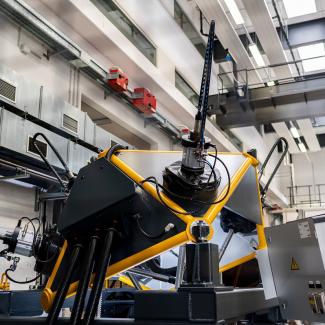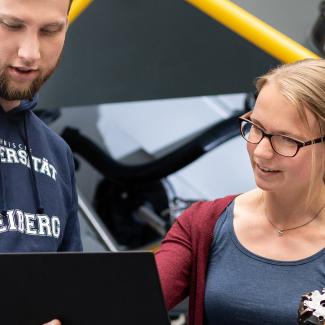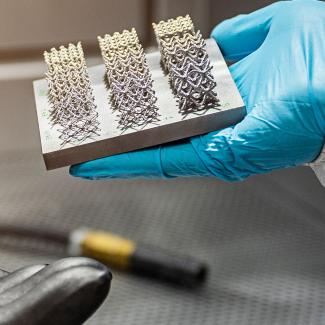Robotics
Autonomously operating robots currently epitomise technological change and are making inroads into everyday life. They take on transport or surveillance tasks, mow the lawn or steer us through traffic. Increasingly complex tasks that were previously reserved for humans can now be mastered using more powerful sensors, artificial intelligence methods, sophisticated mechanics and distributed algorithms.
The Robotics degree programme at TU Bergakademie Freiberg prepares future engineers to help shape this change and understand it as an interdisciplinary challenge.
The degree programme combines mathematical and scientific principles with computer science, electrical engineering and mechanical engineering. Building on introductory courses in mathematics and physics, specific lectures on topics such as software development, embedded systems, artificial intelligence, virtual reality and machine learning follow over the course of the programme. Further courses on automation technology, electrical engineering and sensor technology, including sensor data evaluation, create a deeper understanding of the complex systems of autonomous robots.
On the application side, students can choose from the fields of mining, geomonitoring, technology and the environment in order to always be able to describe the robot system from the perspective of an application scenario. The Robotics degree programme at TU Bergakademie Freiberg is based to a large extent on practical experience. Theoretical knowledge is expanded through a variety of laboratories and project tasks, which are then realised with the Bergakademie's RoboCup team, among others. A practical semester completes this concept and provides insights into commercial tasks in an autonomous context.
In the end, students gain a holistic understanding of autonomous robot systems and, building on this, are able to assess and master the challenges of individual applications. They are able to analyse, model, implement and evaluate complex systems in robotics with the help of mathematical, IT, scientific and engineering principles.
- Faculty
-
Faculty of Mathematics and Computer Science (Faculty 1)
- Degree
-
Diploma (Dipl.-Ing.)
- Standard period of study
-
10 Semester
- Part-time possible
-
No
- Start of studies
-
Winter semesterSummer semester
- Admission requirement
-
Abitur or subject-specific higher education entrance qualification or an entrance qualification recognized as equivalent
Language requirement
- Application: with at least B1 level German
- Admission to the degree program: with C1 level German (e.g. DSH-2)
- language courses and DSH exam at TUBAF
- Course language
-
German
Robotics has great potential applications in many industries and is already being used very successfully, e.g. in:
- Production
- Logistics and transport
- Service, even under difficult conditions
- In the field of manufacturing and services for autonomous robotic systems
Why study robotics at TUBAF?
The Robotics degree programme is a unique future-oriented combination of practical, theoretical and application-oriented computer science and engineering content.
The project-based learning experiences with intensive personal supervision lead to an extremely sought-after degree in industry and beyond.
Interests and skills you should bring
An interest in formal methods and teamwork is just as helpful in robotics as a love of experimentation.



